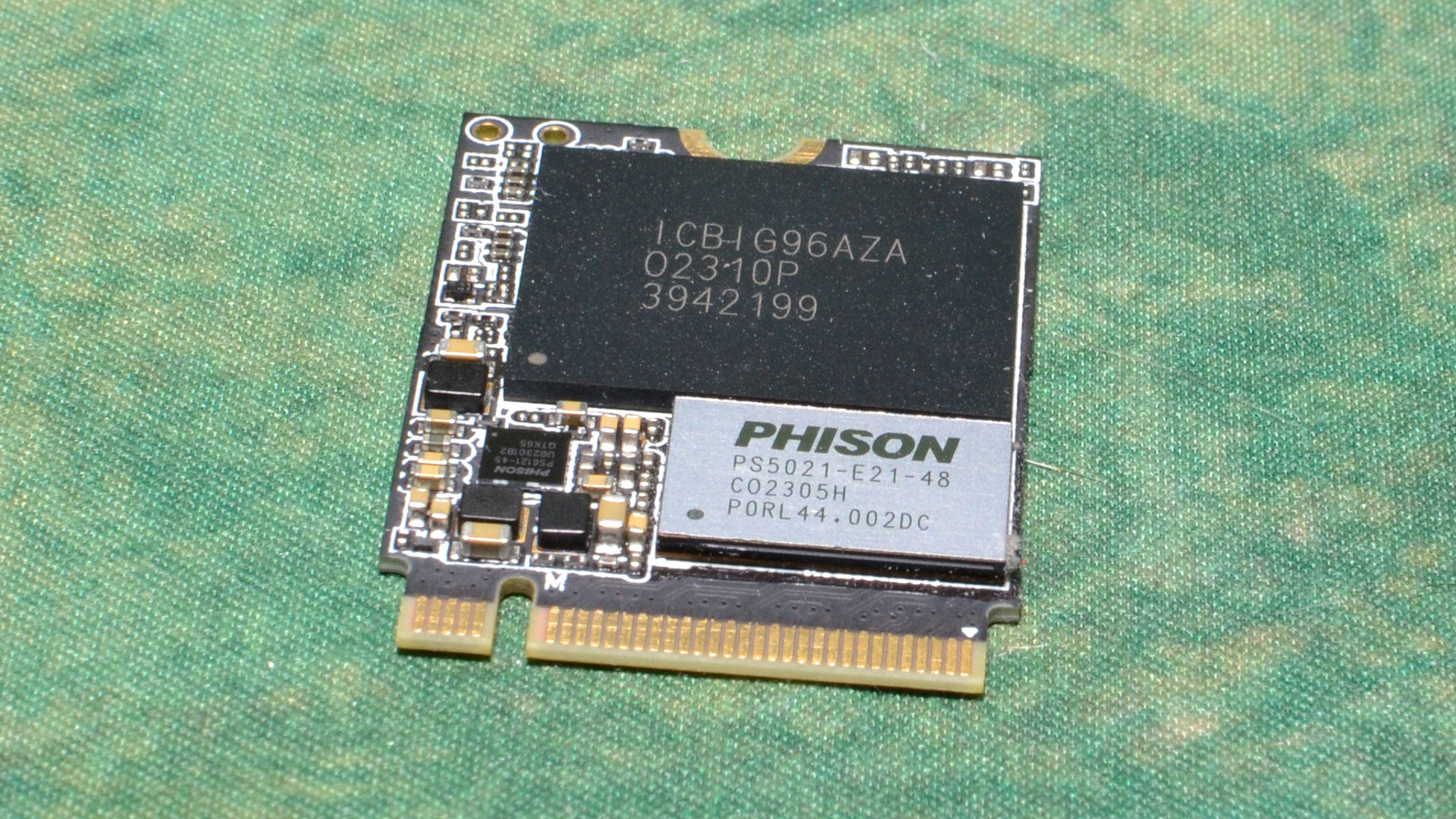Tom's Hardware Verdict
The Teamgroup MP44S is a fine way to get your Steam Deck or ROG Ally’s internal storage up to 2TB, and it’s not bad at 1TB, either. Performance is strong enough where it matters, although its use of QLC keeps it from always being the best option, especially for the ROG Ally.
Pros
- +
Up to 2TB in the M.2 2230 form factor
- +
PCIe 3.0 performance is more than enough for the Steam Deck
Cons
- -
QLC has weaker performance in some cases
- -
It may not be the best option at 1TB
Why you can trust Tom's Hardware
If there’s one thing that can be guaranteed, it’s that Teamgroup will put out a drive to fit any niche, and the MP44S is no exception. It comes as no surprise that Teamgroup wanted to jump on the M.2 2230 bandwagon, given the growing popularity of the Steam Deck and ROG Ally. The portable gaming PC revolution has begun in earnest, and Teamgroup has been eager to put out an SSD to help that along, one that could fulfill even the desire for up to 2TB of tiny - but fast - internal storage. The MP44S may not be the first to market, and it is just one of many. Still, it’s another fair alternative that assists in bringing down prices for this increasingly desirable form factor, especially at the most-popular 1TB capacity point.
It’s an opportunity because the hardware on many of these drives is no different than what’s on popular M.2 2280 drives. Of course, these 2230 drives usually have to be single-sided to fit nicely in portable systems, which adds physical limitations to the drive’s design. You typically won’t find DRAM on an M.2 2230 SSD, except in the rare case that the components are embedded and the drive will be limited to a single NAND package. This puts some constraints on drive capacity, but QLC makes even 2TB a reasonable option, and honestly, the performance for the Steam Deck is pretty good, even with a QLC SSD. This makes drives like the MP44S a pretty solid upgrade, especially if you saved some money going with a 64GB base Steam Deck.
Teamgroup doesn’t compromise the MP44S's controller, using the fast Phison E21T. This controller has been at the heart of many of the best budget PCIe 4.0 SSDs on the market. The Steam Deck is restricted to the PCIe 3.0 interface, but the ROG Ally and other devices can use the additional bandwidth gifted by the 4.0 interface.
Future DRAM-less drives, including those with TLC, might pull ahead of a drive like the MP44S, but it’s a sensible option for now. SD cards are fine and dandy, but this hardware is of a higher class — something to keep in mind as the ROG Ally has had SD card issues. Portable storage also works, but you don’t always want to drag that around with you. So grab an installation guide, take your time, and enjoy a real SSD like the MP44S.
Specifications
| Product | 1TB | 2TB |
|---|---|---|
| Pricing | $94.99 | $ 199.99 |
| Form Factor | M.2 2230 | M.2 2230 |
| Interface / Protocol | PCIe 4.0 x4 / NVMe 1.4 | PCIe 4.0 x4 / NVMe 1.4 |
| Controller | Phison E21T | Phison E21T |
| DRAM | N/A (HMB) | N/A (HMB) |
| Memory | Micron 176-Layer QLC | Micron 176-Layer QLC |
| Sequential Read | N/A | 5,000 MB/s |
| Sequential Write | N/A | 3,500 MB/s |
| Random Read | N/A | 480K |
| Random Write | N/A | 500K |
| Security | N/A | N/A |
| Endurance (TBW) | 250TB | 450TB |
| Part Number | TM5FF3001T0C101 | TM5FF3002T0C101 |
| Warranty | 5-Year | 5-Year |
The Teamgroup MP44S is available at 1TB and 2TB, currently for $94.99 and $199.99, respectively. This is slightly more expensive than some direct competitors like the Addlink S91. QLC isn’t quite as compelling at 1TB, but it can be workable if it undercuts the TLC alternatives by enough.
The MP44S can hit up to 5,000 / 3,500 MB/s for sequential reads and writes and up to 480K / 500K IOPS for random reads and writes. There’s a five-year warranty with 250TB and 450TB of writes for the two capacities offered. Teamgroup was unable to give us specific performance information for the 1TB, but given what we see with similar drives, it should be close to the 2TB.
Software and Accessories
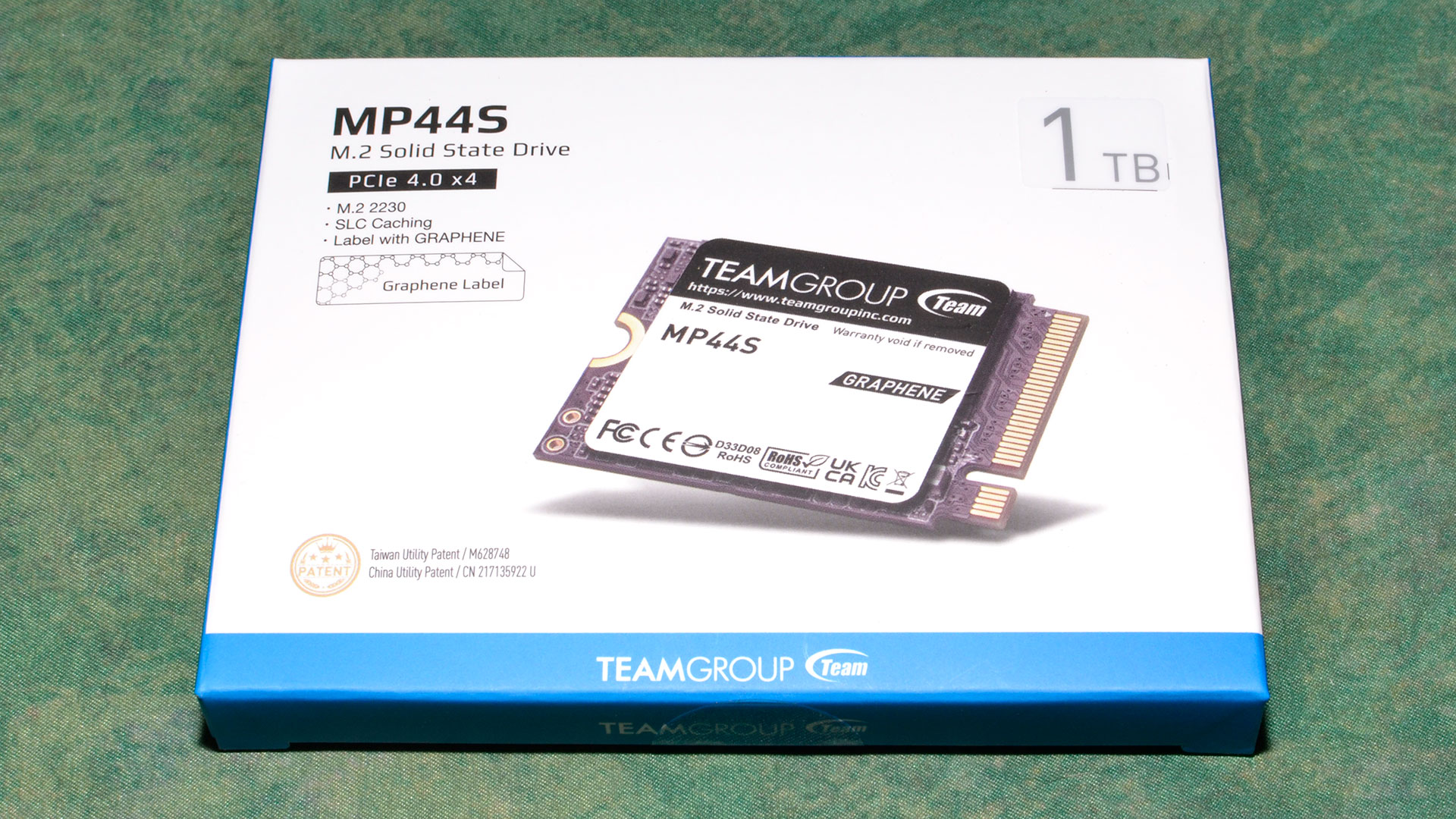
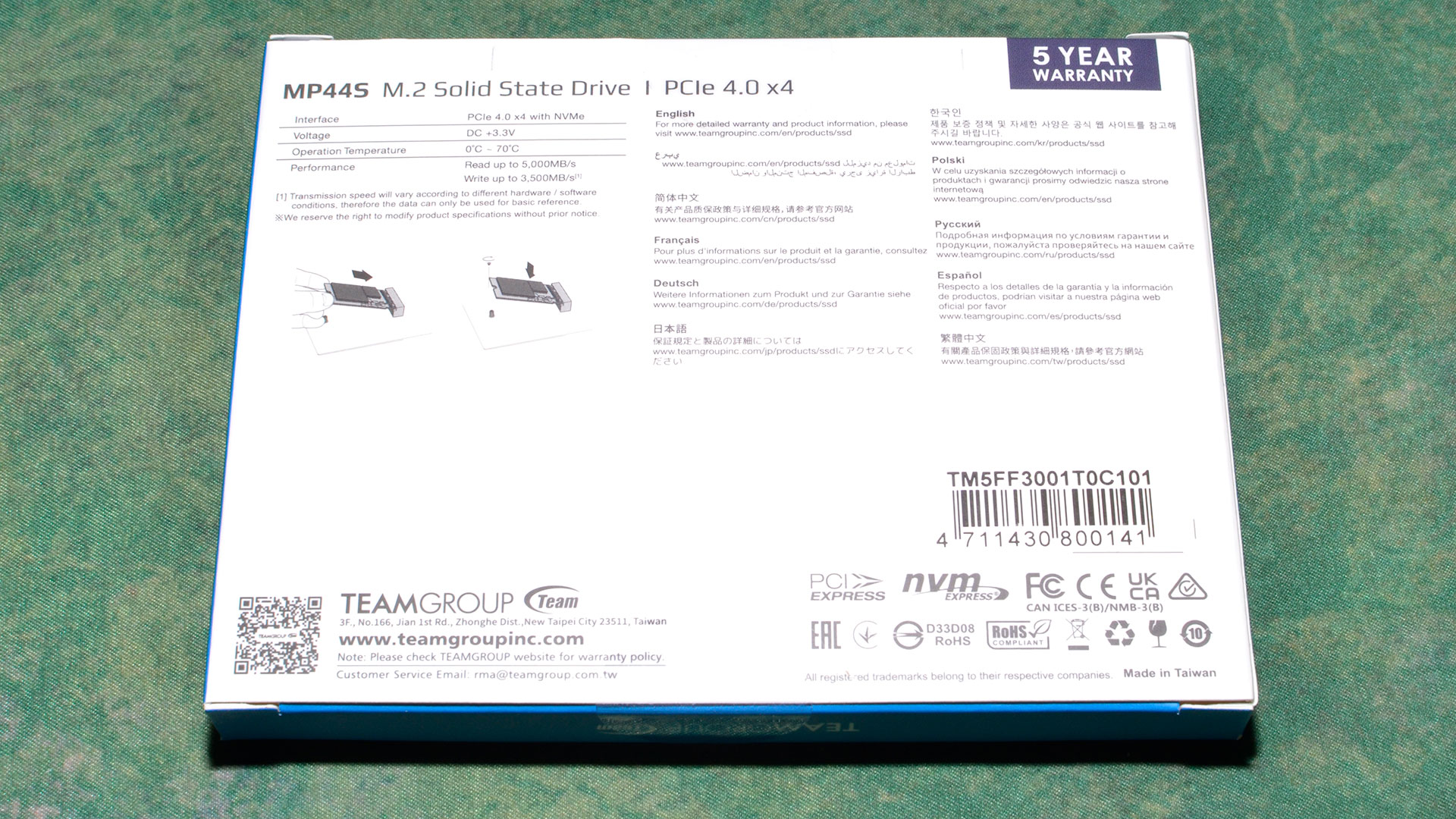
Teamgroup has its own SSD SMART monitoring software, or SSD SMART Tool, available for download on its website. It comes with a manual that indicates the software can be used to grab basic drive information, such as the SMART readings, and the application also includes a built-in CrystalDiskMark-like benchmark.
A Closer Look
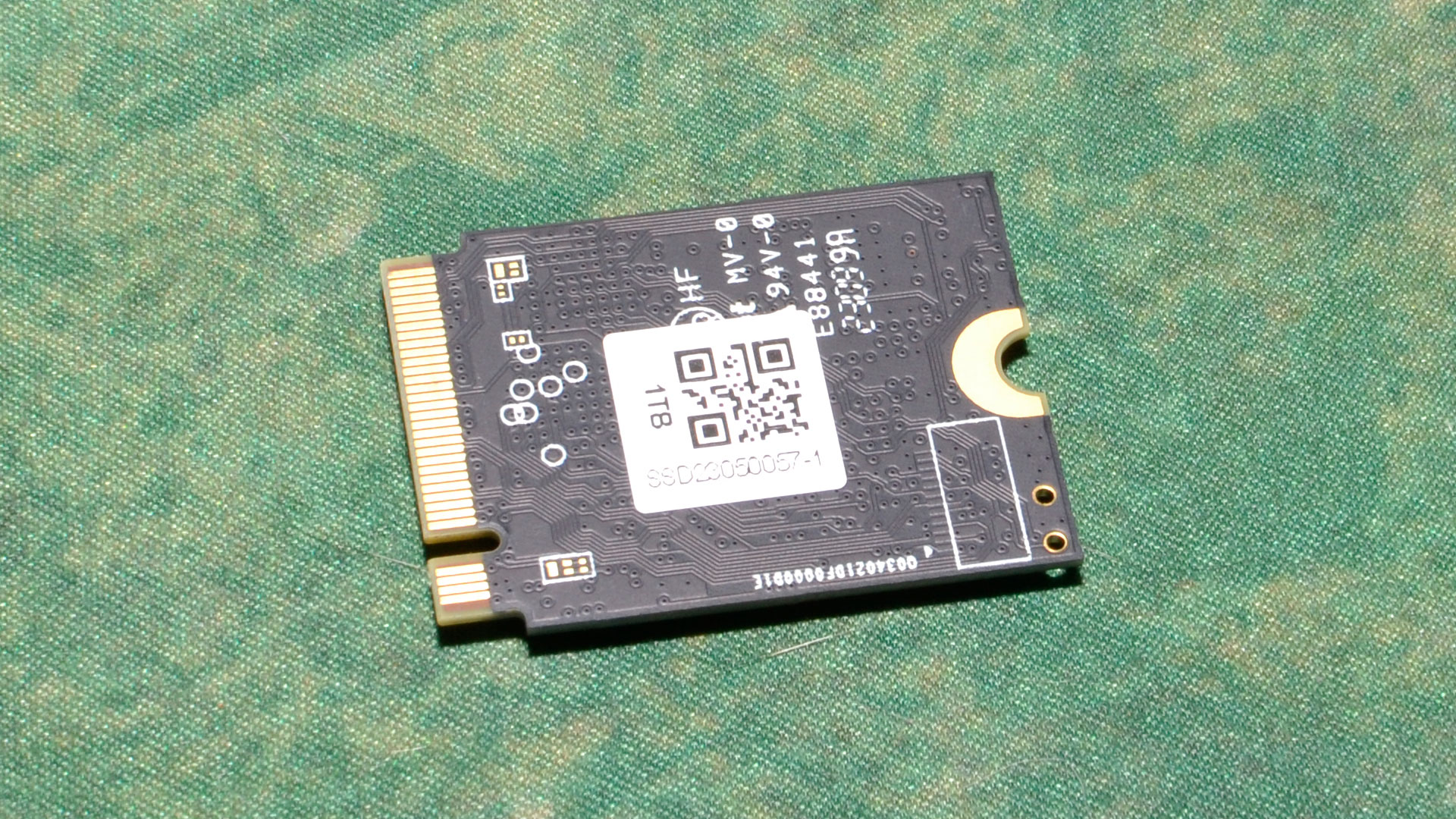
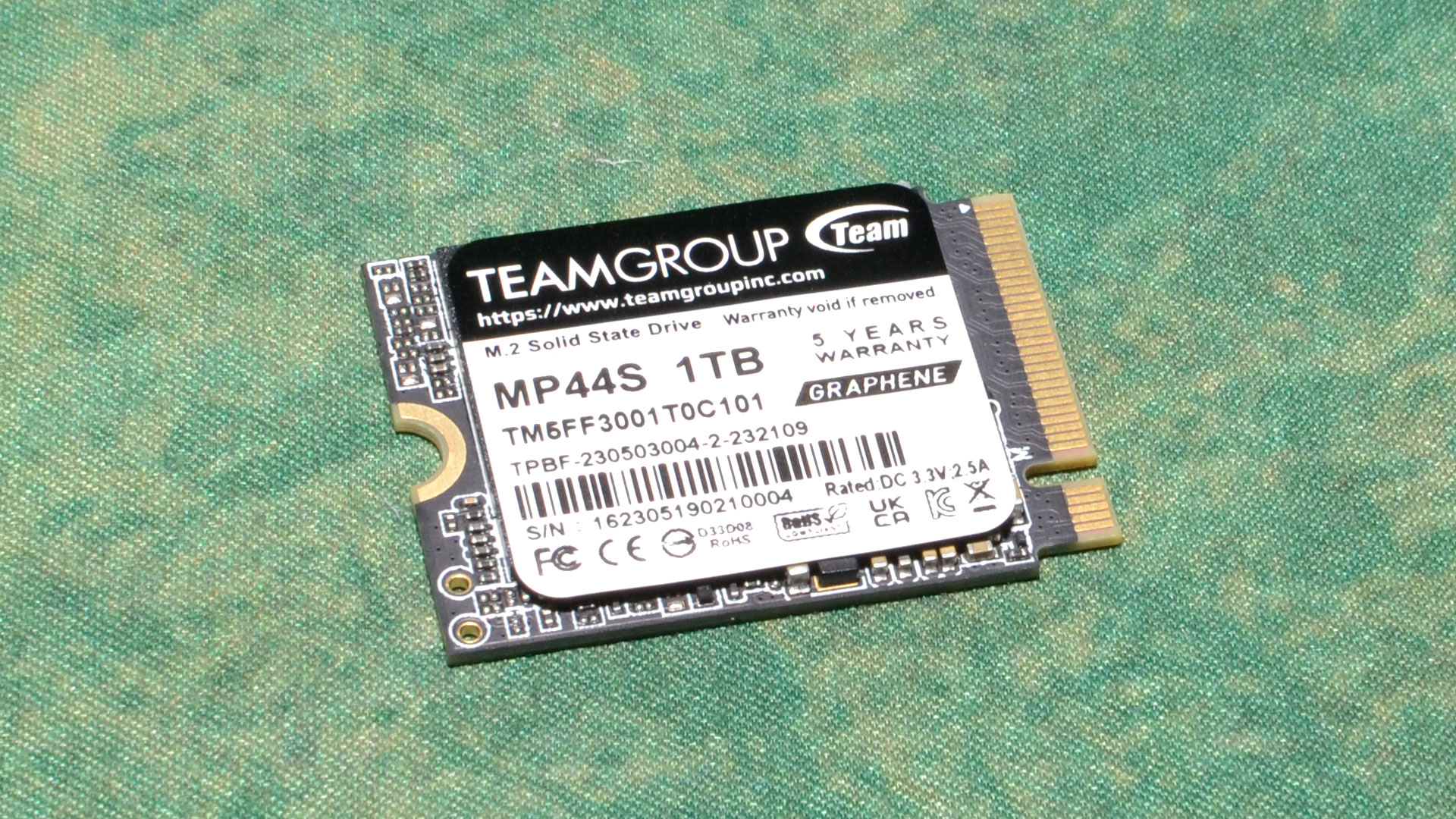
There’s not too much to the MP44S. It’s a single-sided SSD in the M.2 2230 form factor, short and slender enough to fit into the Steam Deck, ASUS ROG Ally, and other portable systems. Teamgroup uses a graphene label to cover the controller and a single NAND package for heat dissipation.
This standard layout is also used on the Sabrent Rocket Q4 2230 and Addlink S91. To reach 2TB, the MP44S has to use Micron’s 176-Layer QLC (N48R), but it’s also used at 1TB. It is technically possible to use TLC flash and achieve 2TB — WD’s SN740 manages the trick — but it’s probably easier and more cost-effective to use QLC. Intel’s QLC is only found in M.2 2230 with the 1TB P41 Plus OEM drive and is, therefore, harder to compare. QLC is more of a compromise at 1TB as there’s not as much interleaving with the dies, but for this level of drive with the E21T, it’s sufficient and is mostly an option to save a few bucks over TLC.
Get Tom's Hardware's best news and in-depth reviews, straight to your inbox.
Micron’s flash is also more efficient than WD’s BiCS5 TLC from our testing, and the 2TB SN740 — which can be gauged to some degree by looking at our SN770 review — loses some performance over its 1TB counterpart. Still, the 2TB SN740 is probably the fastest drive at 2TB, but we think that, at least for the Deck, QLC is a perfectly good compromise there. This does open the door to the 2TB OEM Crucial 2400, although that uses the SMI SM2269XT controller instead of the MP44S’s Phison E21T. In our testing of these controllers, the latter performs as well or better with better power efficiency. The competition at 1TB is much stiffer for QLC.
It’s worth looking into what performance compromises are made with QLC at 1TB. The MP44S and S91 offer this option, and the Rocket Q4 2230 may eventually do so, but there are many TLC alternatives that no longer carry a high price premium. On the other hand, requiring only eight dies of QLC for 1TB is more convenient, and if these drives end up being less expensive, they are probably still fast enough to be a worthwhile alternative.
MORE: Best SSDs
MORE: Best External SSDs and Hard Drives
MORE: How We Test HDDs And SSDs
MORE: All SSD Content

Shane Downing is a Freelance Reviewer for Tom’s Hardware US, covering consumer storage hardware.
